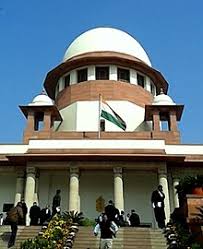What is under challenge before us are the orders passed by the majority of the Judges when a reference was made on a difference of opinion by the Division Bench of the Madras High Court, while dealing with a Writ Petition filed seeking a writ of Habeas Corpus in pursuance of an arrest made, followed by a remand to the judicial custody, and then to the authority concerned. Though arguments at length are made at the Bar, the principal issue is only on the remand in favour of the investigating agency, without seeking any specific prayer challenging the remand orders, though additional grounds were raised. (Para 2)
File back to the Division Bench to adjudicate upon the date of custody to be reckoned followed by the actual days that might be required. (Para 19)
There is no power vested under the PMLA, 2002 to seek custody in favour of an authorized officer. Such an authorized officer is not a police officer and therefore, Section 167(2) of the Code of Criminal Procedure, 1973 (hereinafter referred to as “the CrPC, 1973”), with particular reference to a remand in his favour, is not available. Custody under Section 167(2) of the CrPC, 1973 can only be in favour of a police officer and not any other agency. (Para 21)
There is nothing in Section 19, which is contrary to the requirement of production under Section 167 of the 1973 Code, but being an express statutory requirement under the 2002 Act in terms of Section 19(3), it has to be complied by the authorised officer. Section 19, as amended from time to time, reads thus… (Para 34(88))
We have no hesitation in holding that the only remedy open to the appellant is to approach the appropriate Court under the Statute. This was obviously not done. We may also note that the appellant was very conscious about his rights and that is the reason why, by way of an application he even opposed the remand. (Para 81)
SUMMATION OF LAW: CONCLUSION:
- When an arrestee is forwarded to the jurisdictional Magistrate under Section 19(3) of the PMLA, 2002 no writ of Habeus Corpus would lie. Any plea of illegal arrest is to be made before such Magistrate since custody becomes judicial
- Any non-compliance of the mandate of Section 19 of the PMLA, 2002 would enure to the benefit of the person arrested. For such noncompliance, the Competent Court shall have the power to initiate action under Section 62 of the PMLA, 2002.
- An order of remand has to be challenged only before a higher forum as provided under the CrPC, 1973 when it depicts a due application of mind both on merit and compliance of Section 167(2) of the CrPC, 1973 read with Section 19 of the PMLA 2002.
- Section 41A of the CrPC, 1973 has got no application to an arrest made under the PMLA 2002.
- The maximum period of 15 days of police custody is meant to be applied to the entire period of investigation – 60 or 90 days, as a whole.
- The words “such custody” occurring in Section 167(2) of the CrPC, 1973 would include not only a police custody but also that of other investigating agencies.
- The word “custody” under Section 167(2) of the CrPC, 1973 shall mean actual custody.
- Curtailment of 15 days of police custody by any extraneous circumstances, act of God, an order of Court not being the handy workof investigating agency would not act as a restriction.
- Section 167 of the CrPC, 1973 is a bridge between liberty and investigation performing a fine balancing act.
- The decision of this Court in Anupam J. Kulkarni (supra), as followed subsequently requires reconsideration by a reference to a larger Bench. (Para 88)
The Registry is directed to place the matter before Hon’ble the Chief Justice of India for appropriate orders to decide the larger issue of the actual import of Section 167(2) of the CrPC, 1973 as to whether the 15 days period of custody in favour of the police should be only within the first 15 days of remand or spanning over the entire period of investigation – 60 or 90 days, as the case may be, as a whole. (Para 91)
SUPREME COURT OF INDIA
2023 STPL(Web) 157 SC
[2023 INSC 677]
Senthil Balaji Vs. State Represented By Deputy Director And Ors.
Criminal Appeal Nos. 2284-2285 of 2023 (@Slp (Criminal) Nos. 8939-8940 of 2023) With Criminal Appeal Nos. 2288-2289 of 2023 (@Slp (Criminal) Nos. 8652-8653 of 2023) Criminal Appeal No.__2286 Of 2023 (@Slp (Criminal) No.7437/2023) Criminal Appeal No._2287__of 2023 (@SLP (Criminal) No.7460/2023) Criminal Appeal No.________2290_______of 2023 (@SLP (Criminal) No. 8750/2023)-Decided on 9-8-2023
https://stpllaw.in/wp-content/uploads/2023/08/2023-STPLWeb-157-SC.pdf







